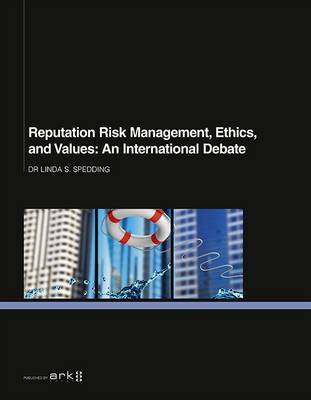REPUTATION RISK is an increasingly recognised and valued area of risk management. It may be considered as a strategic, as opposed to operational, aspect of risk. As reputation is based on perception, emotions, and behaviour, it is largely intangible and its impact is indirect. Although some consider that reputational risk cannot be measured, many observers agree that a good reputation is a major business asset. Taking into account the recent and growing influence of Internet technology applications, and their impact on the speed with which reputations can be damaged or lost, it is important to understand the many and serious ways in which reputational value can be affected today - and to incorporate such considerations into any risk management system. As corporate reputation drives stakeholder behaviour, understanding and assessing reputational risk is vital for any organisation. Understanding of reputation risk has evolved over at least the last decade. Recent risk management surveys carried out by Aon around the globe have highlighted loss of reputation as one of the most significant threats to a business after business interruption.1
These surveys have also pointed out that the key areas of concern for brand management are ethics, corporate governance, compliance, and product quality. It now takes more than just good public relations and a clever advertising campaign to secure financial success - ongoing reputational due diligence and corporate governance exercises are needed. If a company commits to an idea, it does so in public and will therefore be subject to public scrutiny and examination. Indeed, ongoing consultation with stakeholders is the best way to ascertain stakeholder perceptions and expectations about building credibility. Times and business priorities are changing at a rapid pace. No longer do organisations aspire to profit for shareholders alone; they are increasingly answerable to other stakeholders. This gives an impetus to the international debate on reputation risk and integrated reputation risk management. As a result of regulatory and media pressure, in particular, transparency, openness, and fair play are needed to be successful and sustainable in business today. While traditional concepts are still relevant, and are referred to in this report, new meanings are also developing.
It is a constant evolutionary process which few organisations can avoid, regardless of size, sector, or location. Corporate reputation is now very much defined in stakeholder terms. One definition of corporate reputation describes it as the 'aggregate perceptions of multiple stakeholders about a company's performance'.2 A helpful guide is that a good reputation is attained when stakeholders' expectations and experiences of the company are aligned. Stakeholder expectations represent the expectations of all conceivable parties interested - or in some way involved - in the workings and development of a company, private entity, or organisation. Moreover, the stakeholders that really appear to matter to the private sector are invariably customers, employees, and investors. Others may include regulators, strategic partners, suppliers, and the local community. Risks a company faces include having a product boycotted, considered unfashionable, of poor quality, or not purchased because of bad press.
In order to minimise these risks, it is sensible to address stakeholders' concerns and interests and thereby influence their perceptions, encouraging purchasing decisions and investment, whilst also ensuring reduced exposure to liabilities. This will also give a business the opportunity to recognise market trends faster, change more rapidly, and predict the social effect on the economic aspect of their business. Therefore a wider range of research should be undertaken with regards to stakeholder groups, and an example of this is the stakeholder analysis provided later for discussion or debate.
The following are the most significant areas where a risk to reputation may arise: Brand damage; Communications and crisis management; Corporate governance, leadership, and board competency failures; Corporate responsibility (CR) and corporate sustainability (CS) issues; Delivering customer promise; Financial performance and long-term investment value irregularities, restatements, profit warnings, or missed targets; Illegal activities, such as fraud, or poor regulatory compliance; IT disruptions that result from business continuity and IT security failures; and Workplace talent and culture. It is more and more evident that businesses cannot afford to ignore risks related to their reputation and brand. This report is not intended to deal with every element or aspect of reputation risk management: the objective is to consider reputational issues having regard to corporate governance, risk management, due diligence, and related drivers.
The report combines traditional business strategies with recent trends in these areas in an accessible manner that enables business representatives and their advisers to operate in a more proactive and responsible way. A further objective is to provide an overview of the key concerns and offer some practical tools in the form of checklists and case studies that can assist with raising awareness and business planning. The reader should appreciate that this report regards reputational risk management as an ongoing exercise. It extends to areas of business activity that go well beyond a crisis, disaster, or events such as transactions or deals with which it is usually associated to embrace many other aspects of business operations and performance. References: 1. Aon Risk Solutions, 'Global Risk Management Survey 2013', available at www.aon.com/2013GlobalRisk. 2. Fombrun, C., Gardberg, N., and Sever, J., 'The Reputation Quotient: A multi-stakeholder measure of corporate reputation', Journal of Brand Management, Volume 7, 2000.
- ISBN10 1783581271
- ISBN13 9781783581276
- Publish Date 14 May 2014
- Publish Status Inactive
- Out of Print 25 May 2022
- Publish Country GB
- Imprint Ark Group
- Format Paperback
- Pages 155
- Language English
